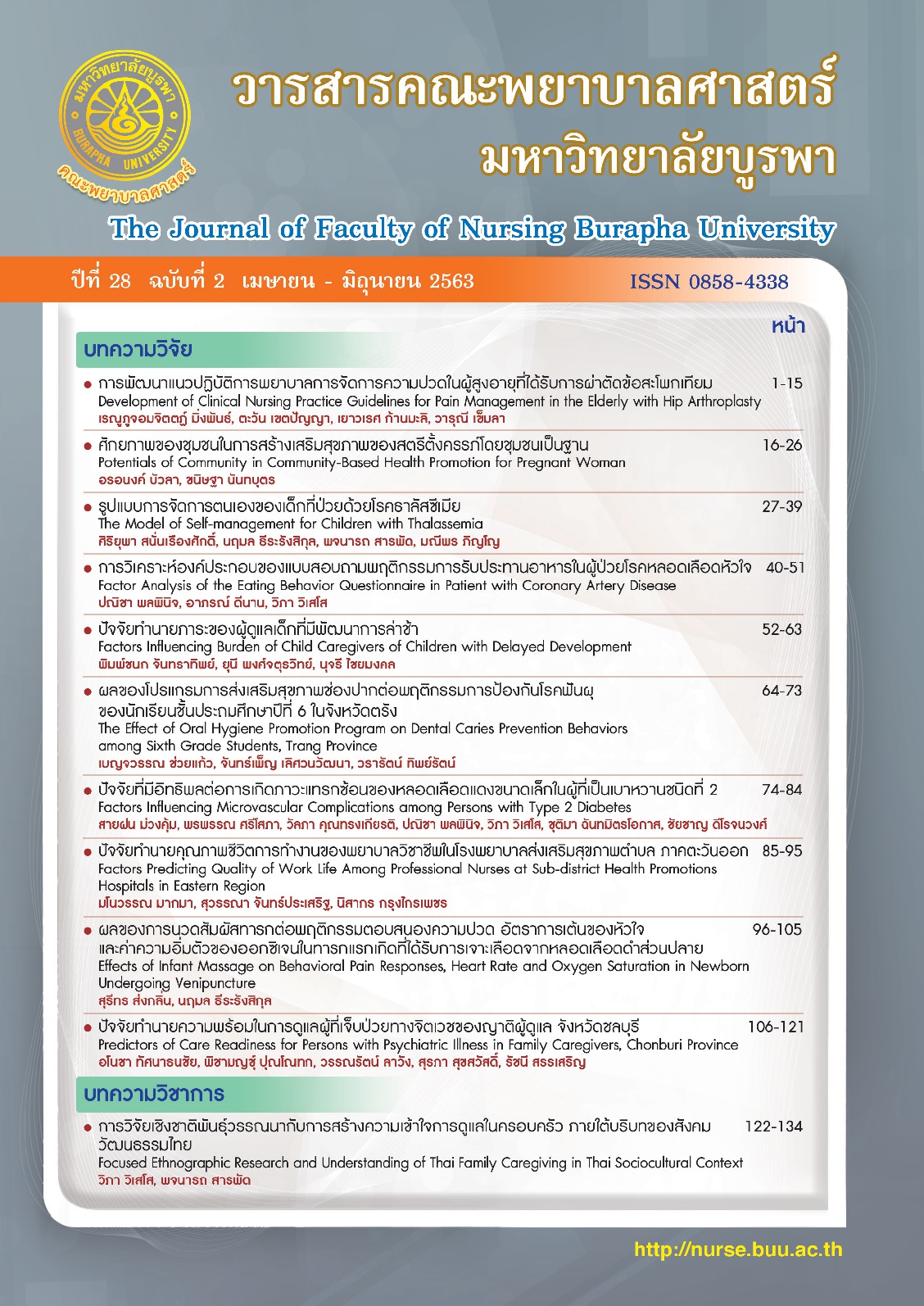ปัจจัยทำนายภาระของผู้ดูแลเด็กที่มีพัฒนาการล่าช้า
คำสำคัญ:
ภาระ, ผู้ดูแลเด็ก, พัฒนาการล่าช้า, ความสามารถในการดูแลตนเอง, การสนับสนุนทางสังคมบทคัดย่อ
เด็กที่มีพัฒนาการล่าช้าจะช่วยเหลือตนเองได้น้อย จึงส่งผลให้เกิดภาระของผู้ดูแลเด็ก การวิจัยครั้งนี้เป็นแบบ
หาความสัมพันธ์เชิงทำนายนี้ มีวัตถุประสงค์เพื่อศึกษาปัจจัยทำนายภาระของผู้ดูแลเด็กที่มีพัฒนาการล่าช้า กลุ่มตัวอย่าง
เป็นผู้ดูแลเด็กที่มีพัฒนาการล่าช้าที่นำเด็กมารับบริการแผนกผู้ป่วยนอก คลินิกพัฒนาการและพฤติกรรมเด็กสถาบัน
ราชานุกูลจังหวัดกรุงเทพมหานคร จำนวน 76 คน คัดเลือกกลุ่มตัวอย่างแบบสะดวก เก็บรวบรวมข้อมูลระหว่างเดือน
พฤษภาคม พ.ศ. 2562 - มิถุนายน พ.ศ. 2562 เครื่องมือที่ใช้ในการเก็บรวบรวมข้อมูลประกอบด้วย แบบสอบถามข้อมูล
ทั่วไป แบบสอบถามความสามารถในการดูแลตนเองของเด็ก แบบสอบถามการสนับสนุนทางสังคม และแบบสอบถาม
ภาระการดูแลของผู้ดูแลเด็กที่มีพัฒนาการล่าช้า ซึ่งแบบสอบถามทุกชุดได้ผ่านการตรวจสอบความตรงตามเนื้อหา
จากผู้ทรงคุณวุฒิแล้ว และหาความเชื่อมั่นของแบบสอบถามมีค่าสัมประสิทธิ์แอลฟาครอนบาค (Cronbach’s alpha
coeffcient) เท่ากับ .85, .92 และ .93 ตามลำดับ วิเคราะห์ข้อมูลด้วยสถิติพรรณนา และสถิติถดถอยพหูคูณ
ผลการวิจัยพบว่า ความสามารถในการดูแลตนเองของเด็ก และการสนับสนุนทางสังคมสามารถทำนายภาระของ
ผู้ดูแลเด็กที่มีพัฒนาการล่าช้าได้ร้อยละ 39.2 (Adjusted R2 = .375, p < .001) ซึ่งปัจจัยที่สามารถทำนายได้ดีที่สุดคือ
ความสามารถในการดูแลตนเองของเด็ก สามารถทำนายภาระของผู้ดูแลเด็กที่มีพัฒนาการล่าช้าได้ ร้อยละ 23.7
(b = -.441, p < .001) และปัจจัยตัวที่สอง คือ การสนับสนุนทางสังคมร้อยละ 15.5 (b = -.396, p < .001)
ผลการศึกษาครั้งนี้เสนอแนะว่า พยาบาลควรพัฒนารูปแบบการดูแลเด็กที่มีพัฒนาการล่าช้า โดยเน้นความสามารถ
ในการดูแลตนเองของเด็กและการสนับสนุนทางสังคมแก่ผู้ดูแลเด็ก เพื่อเพิ่มประสิทธิภาพในการดูแลเด็กที่มีพัฒนาการ
ล่าช้าให้มากขึ้น
เอกสารอ้างอิง
Chantarathip, P. (2010). Factors predicting stress in caring for mothers with autistic children. Thesis Master of Nursing Science, Mental Health and Psychiatric Nursing, Graduate School, Chiang Mai University. [In Thai]
Charatcharungkiat, N & Wacharasindhu, A. (2013). Quality of life among caregivers of children with autistic spectrum disorders and associated factors. J Psychiatr Assoc Thailand, 58(3), 233-244. [In Thai]
Chumjit, S. (2012). The effects of using empowerment programs on perceived efficacy in the care of children with attention deficit hyperactivity disorder. Bangkok: Yuwaprasart Waithayopathum Hospital. [In Thai]
Chumsri, S., Chaimongkol, N. & Sananreugsak, S. (2014). Effects of the child caregiver’s empowerment promoting program on ability and burden to care for children with cerebral palsy. The Journal of Faculty of Nursing Burapha University. 22(4), 35-46. [In Thai]
Cohen, J. (1992). A power primer. Psychological Bulletins, 112, 155-159.
Department of Mental Health. (2014). Statistical Report of the Department of Public Health, Ministry of Public Health. Can be accessed from https://www.ryt9.com/s/prg/1976334.
Hayeemasae, K., Sangsupawanitch, P., & Parinyasutinun, U. (2013). Comparative study on social support of caregivers of children with autism spectrum disorder and caregivers of typical development children in Songklanagarind hospital. The 4th Hatyai National and International Conference. Research for the development of Thai society (118-127). Songkla: Hatyai. [In Thai]
Khunrungsissombon, K. (2011). Quality of life of parents of slow development children. .Journal of Suanprung, 28(1), 5-16. [In Thai]
Lalana, P. (2007). Effectiveness of coping skill training program on depression in early adolescent. Nursing Science, 29(12), 39-47.
Lerthattasilp, T. (2007). Depression and caregiver burden among caregivers of children with autistic spectrum disorders at Thammasat University Hospital. Bangkok: Thammasat University Hospital. [In Thai]
Mai, T. L. A., Chaimongkol, N, Pongjaturawit, Y. (2015). Factors related to burden among caregiver of children with autism in Vietnam. Journal of Pediatric Nurse, 25(1), 46-56. [In Thai]
Obert, M. T. (1991). Appraisal of caregiving scale. Madison: University of Wisconsin.
Orapiriyakul, R., Benjakul, W. & Kwunkaew, S. (2014). Predictor of burden of care in primary family caregivers of children with autism in the west-coast southern Thailand. Journal of Faculty of Nursing, Prince of Songkla University, 34(3), 39-55. [In Thai]
Orem, D. E. (1991). Nursing: Concepts of practice (4th ed.). St. Louis, MO: C. V. Mosby.
Palapirom, R., Prasopkittikun, T. & Vichitsukon, K. (2010). Effects of an empowerment program on
mothers’ self-efficacy in the care of children with developmental delays. Journal of Nursing Mahidol University, 28(4), 68-75. [In Thai]
Photong, P., Chansuvarn, S., Khachat, S., & Sanchalad, S. (2014). The study of the health status of children with autism knowledge and stress of caregivers’ autistic children receiving services from the Special Education Center Region 5, Suphan Buri Province. Journal of Phraopokklao Nursing College, 25(2), 26-40. [In Thai]
Preechapongmit, K. (2012). Factor related to caregiving burden among caregivers of children with asthma. Nursing Journal, 39(4), 1-6. [In Thai]
Pushpalatha, R., & Shivakumara, K. (2015). Stress, burden and coping between caregivers of
cerebral palsy and autism children. The International Journal of Indian Psychology, 4(80), 108-114.
Schaefer, C., Coyne, J. C., & Lazarus, R. S. (1981). The health-related function of social support. Journal of Behavioral Medicine, 4, 381-405.
Shyam, R., Kavita & Govil, D. (2014). Stress and family burden in mothers of children with
disabilities. International Journal of Interdisciplinary and Multidisciplinary Studies, 1(4), 152-159.
Sigman, M., & McGovern, C. W. (2005). Improvement in cognitive and language skills from
preschool to adolescence in autism. Journal of Autism Developmental Disorders, 35(1), 15-23.
Srivongpanich, N. (2013). Children with developmental disabilities. Can be accessed from
https://th.rajanukul.go.th/preview-4007.html [In Thai]
Toomnoi, N., Chaimongkol, N. & Phaktoop, M. (2008). Impact of support
from society and family, and family coping behavior on burden of families caring
for exceptional children. Journal of Faculty of Nursing, Burapha University, 16(4), 39-49. [In Thai]
Viriyaprasart, L. (2007). Relationship between some fundamental factors, burden and
general well-being in caregivers of cerebral palsy children who attained at out patient
service department of Rajanukul Institute. Rajanukul institute Journal. 22(2), 95-116.
[In Thai]
Wacharasin, C., Pakthop, M. & Sananreangsak, S. (2006). The development of empower the power of relatives who care for chronically ill children: a case study of thalassemia. Chonburi: Faculty of Nursing, Burapha University. [In Thai]
World Health Organization. (2012). Developmental difficulties in early childhood:
Prevention, early identification, assessment and intervention in low and middle
income countries a review. Turkey Country Office and CEECIS Regional Office.
Yuwaprasart Vaithayopathum Child Psychiatric Hospital (2018). Statistical data, outpatient,
older. Retrieved fromhttp://ycap.go.th/th/index.php/about-us/stat-th/
2018-09-13-03-18-53. [In Thai]





